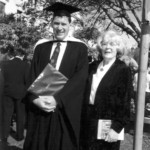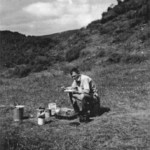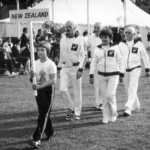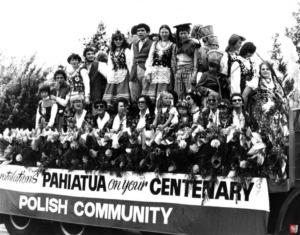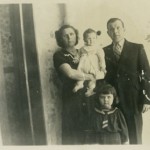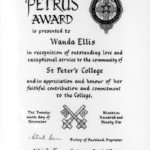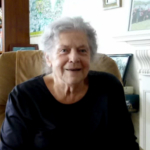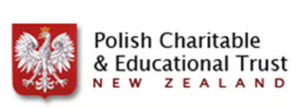Polish Refugees in New Zealand 1944-1951
Exhibitions
Becoming Polish New Zealanders
Józef Zawada: Two things stand out like huge beacons on my life’s horizon. The first is patriotism (love for Poland), which was unshakably implanted in us as part of our upbringing and so strongly reinforced by the tragic experiences of World War II. This intense patriotism has been a persistent driving force in our lives, resulting in us bringing up our children biculturally, living in awareness of political happenings in Poland, and remaining faithful to our secular and religious traditions.
The second beacon is the lifelong bond of belonging to that group of Polish children which arrived in New Zealand in 1944 and initially lived at the Polish Children’s Camp in Pahiatua. Our affinity was brought about by a feeling of individual isolation in a caring but alien community. Having lost our parents and country, we reacted by creating one large family. I know that whenever I meet anyone who was “at the camp”, they are a special person for me – one of us and another member of our extended family.
Some of us have more memories to share with our friends from the camp than with our own families separated from us during the war. This was very evident at our reunion commemorating the 50th anniversary of our arrival in New Zealand. There just wasn’t enough time to catch up with everyone.
I know that my early childhood memories have steadily diminished because I have been unable to reinforce them through normal contact with my parents, siblings, relatives and familiar surroundings. Nevertheless, we not only tried to hold on to what heritage we had but also to eventually pass it on to our children. This was done against a background of the natural assimilation forces to which exiles, refugees and immigrants are subjected.
How did we get assimilated? Once it became clear that a majority of the Polish children would remain in New Zealand, the “assimilation policy”, based on the assumption that new settlers benefit most by being absorbed quickly into the majority culture, was thought to be the most appropriate for us.
However, this assimilation policy overlooks the fact that refugees and exiles are people who have been banished or escaped from their homeland and can be extremely homesick. They have a desire to return home and take their political and religious ideas back with them. Consequently, the last thing they want is to assimilate quickly – they need time to get reconciled to the loss of their homeland, extended family and way of life. Above all, they initially want to be close to their compatriots who share similar views, to keep up their customs, nourish hopes, and maintain mental and spiritual strength by their togetherness. Passing on their culture to the children is of utmost importance to all refugees and exiles, and is seen as a continuation of their fight against a regime which has exiled them. They instinctively tend to resist the assimilation policy.
In our case the policy, in the main, had the opposite effect to what was intended as we tried to preserve our “Polishness” in every possible way. There was a rumour that one influential member of the camp’s administration had a vision of a Polish rural colony – buy a tract of land and settle the children there. But in retrospect, this would have been undesirable and in the long run impractical. It would have been unfair to us because it would have prevented us from making the most of local community life and taking part in local affairs.
Experience shows that migrants’ children quite often marry outside their ethnic group, which is exactly what happened to our children. Migrants are often faced with a situation in which they can hardly communicate with their children and even less with their grandchildren. Fortunately, this has not happened in our case because we came to this country as children and had the opportunity to attend New Zealand schools, learn the English language and absorb the local culture.
Our emotional ties with Poland were originally very strong. As the known members of our families die off, our ties with Poland become weaker. Also, the political climate in Poland has changed and one of our beacons (the movement for Poland’s independence) has been extinguished as Poland is now independent.
The Polish children from the camp are now facing a “mature refugee community crisis”. The personnel who accompanied us, and those fathers, relatives and other Polish displaced persons who arrived after the war and created the framework for the Polish community in New Zealand, have in the main passed away.
Currently, at the forefront of the Polish community, we have the former Polish children from the camp who are now at least in their 60s. We find that there aren’t enough young people to run our associations and clubs despite the determined efforts on our part. Their priorities are naturally to the land of their birth – New Zealand – and not to their parents’ Polish homeland.
Though many of our children are bilingual, ie, they have a reasonable knowledge of the Polish language and most were taught to speak it as a first language, they will not always be able to pass that language to their children. However, quite a few send their children to Polish language classes at Saturday schools in the hope that their own children will learn something of the Polish language, culture and background of their grandparents.
Today, looking back over the years, I feel that the majority of us were assimilated by the “acculturation policy”, which recognises the need of the exiles and refugees to keep their own culture while adapting to the new cultural environment. It gave us a chance to keep our cultural heritage while we gradually came to terms with the social environment in New Zealand.
Now, having raised our children and with grandchildren at a mature age, how do we feel about the whole experience of growing up in two cultures? As the years went by, the Polish children from Pahiatua separated into two groups. The first became fairly quickly assimilated and have little or no contact with the Polish culture or people. The second group has remained strongly attached to Polishness by attending Polish Mass, being in the Polish Association and belonging to Polish clubs, such as the Ladies Circle, choirs, dance groups, Youth Club, Volleyball Club, Chess Club, Bridge Club and Video Club.
This group made a great effort to teach their children the Polish language and culture by maintaining the Polish Saturday schools. It has now realised that because their children and grandchildren were born in New Zealand, and that their lives have been spent in New Zealand, they are more New Zealanders than Poles.
Our community is quickly dwindling in numbers and there is a general realisation among us that the Polish Association and clubs that flourished 40 years ago are now (like the Returned Services Association) suffering from depleted membership and lack of new blood. We are now a community which has lost its young people. This has been brought about by the fact that they have to live in their society, and not in a world which we created for ourselves for the purpose of preserving our culture and continuing our fight against the oppressors of Poland.
We succeeded as a group in becoming good citizens because we had a strong patriotic and religious background – we had discipline and self reliance.
The transition period in the camp, and then at hostels for the younger children, precluded sending young children to local families for assimilation. As the children left the camp, and boarding schools and hostels, they started out on their own. For those of us who were orphans, this was an extremely difficult period of life because once we started out on our own, no one was interested in us. It was a period of loneliness and integration into “normal” life. It was at this stage that the Polish Association and community life it engendered provided a framework within which we could meet in large numbers and satisfy many of our ethnic and social needs.
From my own experience, I conclude that foreign orphans are best brought up and assimilated if kept in a group before being released into the host society. As an ex-orphan, I would rather be brought up in an institution, such as a camp or boarding school, than be adopted out.
In the year of our 60th anniversary of our arrival in New Zealand, we look back with pride. We also look forward with the hope that our children will blend the best of our culture with our adopted country’s culture, thereby enriching New Zealand’s heritage.
New Zealand First Refugees Pahiatua’s Polish Children (3rd edition); p14-17
Voices
Photos
